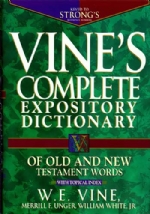$44.99
If you are already a Laridian customer, log in above and we can tell you if you own this product.
Preview Book
Preview the table of contents and a limited selection of text from this book.
 Vines Complete Expository Dictionary of OT/NT Word
Vines Complete Expository Dictionary of OT/NT Word

Vines Complete Expository Dictionary of OT/NT Word
$44.99
Buy It Once, Use It On These Platforms
Description
Study the meaning of biblical words in the original languages—without spending years learning Greek or Hebrew. This classic reference tool has helped thousands dig deeper into the meaning of the biblical text. Explains over 6,000 key biblical words. Includes a brand new comprehensive topical index that enables you to study biblical topics more thoroughly than ever before.
Information for each word includes: English word, English translation or transliteration, word as it appears in original language, part(s) of speech, Strong's reference number, where the word appears and how it is used in the Bible.
Features
- Enrich your Bible study with the only complete Vine's Old and New Testament Expository Dictionary keyed to Strong's reference numbers
- Discover the meaning of more than 6,000 biblical words in their original Greek and Hebrew.
- Includes topical index
Sample Text
Definition for Greek word assigned to Strong's number 25: agapao, in its perfect participle passive form, is translated "beloved" in Ro 9:25; Ep 1:6; Col 3:12; 1Th 1:4; 2Th 2:13. In Jude 1 the best texts have this verb (RV); the KJV, "sanctified" follows those which have hagiazo. See LOVE.
Note: In Lk 9:35, the RV, translating from the most authentic mss., has "My chosen" (eklego), for KJV, “beloved” (agapetos); so in Phlm 2, "sister" (adelphe).
Definition for Hebrew word assigned to Strong's number H7523: rashach, "to kill, murder, slay." This verb occurs more than 40 times in the Old Testament, and its concentration is in the Pentateuch. Rashach is rare in rabbinic Hebrew, and its usage has been increased in modern Hebrew with the exclusive meaning of "to murder." Apart from Hebrew, the verb appears in Arabic with the meaning of "to bruise, to crush."
Rashach occurs primarily in the legal material of the Old Testament. This is not a surprise, as God's law included regulations on life and provisions for dealing with the murderer. The Decalogue gives the general principle in a simple statement, which contains the first occurrence of the verb: "Thou shalt not kill [murder]" (Ex 20:13). Another provision pertains to the penalty: "Whoso killeth any person, the murderer shall be put to death by the mouth of witnesses ..." (Nu 35:30). However, before a person is put to death, he is assured of a trial.
The Old Testament recognizes the distinction between premeditated murder and unintentional killing. In order to assure the rights of the manslayer, who unintentionally killed someone, the law provided for three cities of refuge (Nu 35; Dt 19; Jos 20,21) on either side of the Jordan, to which a manslayer might flee and seek asylum: "... that the slayer may flee thither, which killeth any person at unawares" (Nu 35:11). The provision gave the manslayer access to the court system, for he might be "killed" by the blood avenger if he stayed within his own community (Nu 35:21). He is to be tried (Nu 35:12), and if he is found to be guilty of unintentional manslaughter, he is required to stay in the city of refuge until the death of the high priest (Nu 35:28). The severity of the act of murder is stressed in the requirement of exile even in the case of unintentional murder. The man guilty of manslaughter is to be turned over to the avenger of blood, who keeps the right of killing the manslayer if the manslayer goes outside the territory of the city of refuge before the death of the high priest. On the other hand, if the manslayer is chargeable with premeditated murder (examples of which are given in Nu 35:16-21), the blood avenger may execute the murderer without a trial. In this way the Old Testament underscores the principles of the sanctity of life and of retribution; only in the cities of refuge is the principle of retribution suspended.
The prophets use rashach to describe the effect of injustice and lawlessness in Israel: "... because there is no truth, nor mercy, nor knowledge of God in the land. By swearing, and lying, and killing, and stealing, and committing adultery ..." (Ho 4:1-2; cf. Isa 1:21; Je 7:9). The psalmist, too, metaphorically expresses the deprivation of the rights of helpless murder victims: "They slay the widow and the stranger, and murder the fatherless" (Ps 94:6).
The Septuagint gives the following translation: phoneuein ("murder; kill; put to death"). The KJV gives these senses: "kill; murder; be put to death; be slain."
(NOTE: In PocketBible, definitions include the word being defined in the actual Greek and Hebrew text.)
About the Author(s)
W.E. Vine, M.A., was a classical scholar, skilled expositor, and a trustworthy theologian. Recognized internationally for his outstanding Greek scholarship, his Expository Dictionary of New Testament Words, first published in 1939, represents the fruit of his lifetime labors and is an unsurpassed classic in its field.
System Requirements
Installed size (unless otherwise indicated): Approximately 7.875 MB. iPhone, iPad, and iPod touch Requires iPhone, iPod touch, or iPad running latest version of iOS. Download size: 7.875 MB. Android Requires Android OS 4.4 or later. Download size: 7.875 MB. Windows Requires Windows 10, 11 or later. Download size: 7.875 MB. macOS Requires macOS 10.13 or later. Download size: 7.875 MB.
The Fine Print
Copyright © 2010-2026 by Laridian, Inc. All Rights Reserved.
Laridian and PocketBible are registered trademarks of Laridian, Inc. DailyReader, MyBible, Memorize!, PrayerPartner, eTract, BookBuilder, VerseLinker, iPocketBible, DocAnalyzer, Change the way you look at the Bible, and The Bible. Anywhere. are trademarks of Laridian, Inc. Other marks are the property of their respective owners.
About You
- You are viewing the mobile version of our website.
- You are not logged in.
- Your IP Address: 216.73.216.22
- Site IP Address: 69.167.186.191
Social Media
Like and follow us on Facebook.
Stay Informed
We announce new products via email. If you ask to be removed from any of our mailings, you will not receive these notifications. If your email address changes, make sure you change it here, too.
From time to time we post things on our blog and on Facebook.
The Fine Print
Copyright © 2010-2026 by Laridian, Inc. All Rights Reserved.
Laridian, PocketBible, and MyBible are registered trademarks of Laridian, Inc. DailyReader, Memorize!, PrayerPartner, eTract, BookBuilder, VerseLinker, iPocketBible, DocAnalyzer, Change the way you look at the Bible, and The Bible. Anywhere. are trademarks of Laridian, Inc. Other marks are the property of their respective owners.
Products by Platform
Bible Reader Software
BookBuilder Software
- BookBuilder for Windows
- BookBuilder Pro for Windows
- BookBuilder for macOS
- BookBuilder Pro for macOS
- Self-Publishing Info
About Laridian
Products by Type
Your Account
- You are not logged in.
- Your IP Address: 216.73.216.22
- Site IP Address: 69.167.186.191
- Your Account Information
- Your Order History
- Your Downloads
- Your Notes, Highlights, and Bookmarks
- Your BookBuilder Books
- Your Shopping Cart
- Register Purchase from a Store
Best Ways to Get Help
You can get the fastest help by helping yourself.
- Make sure you download and install the PocketBible app that is required to read the Bibles or books you bought
- Read the confirmation email we send you when you make a purchase
- Read the help that's built into each of our products
- Look through our Frequently Asked Questions
- Submit a Support Ticket
- Email us at support@laridian.com





